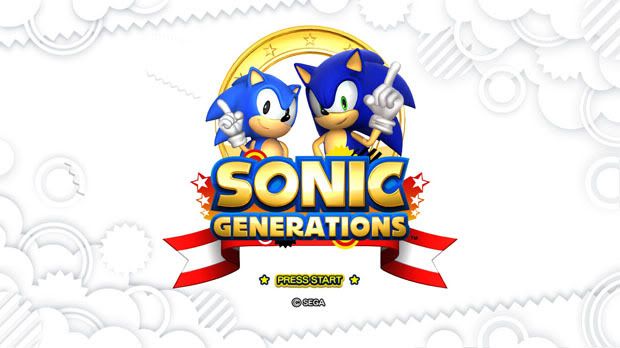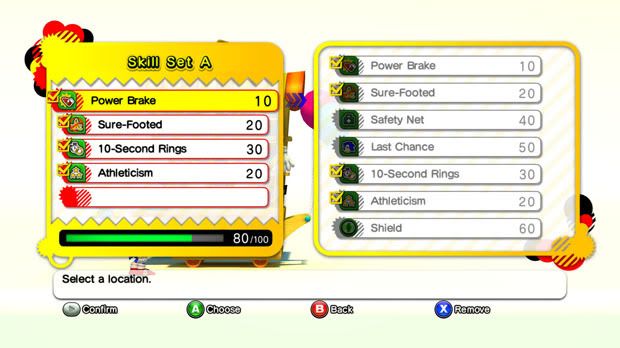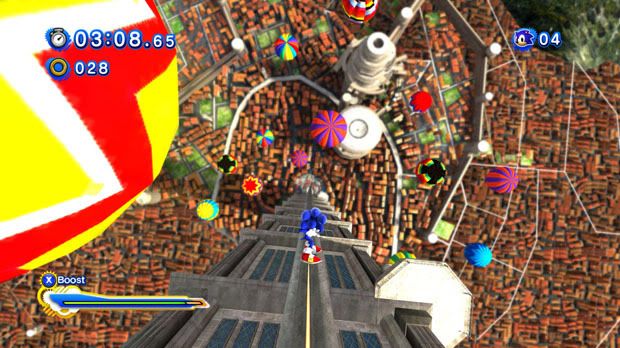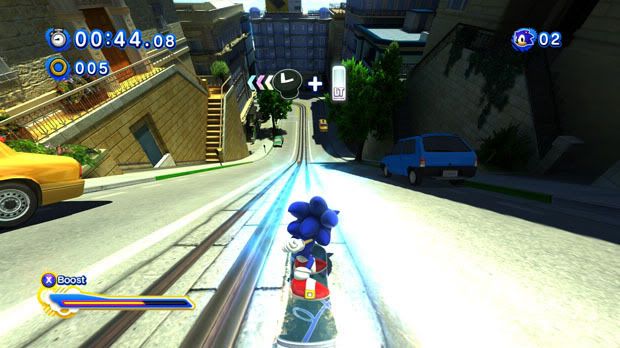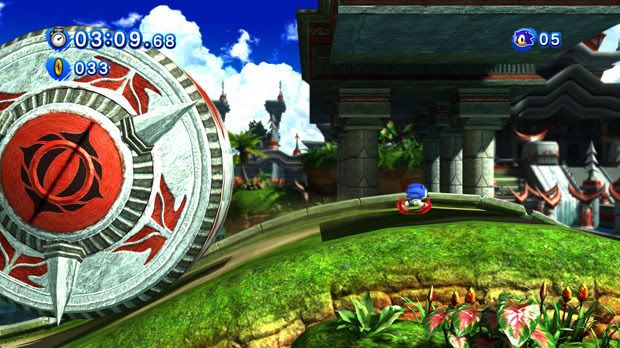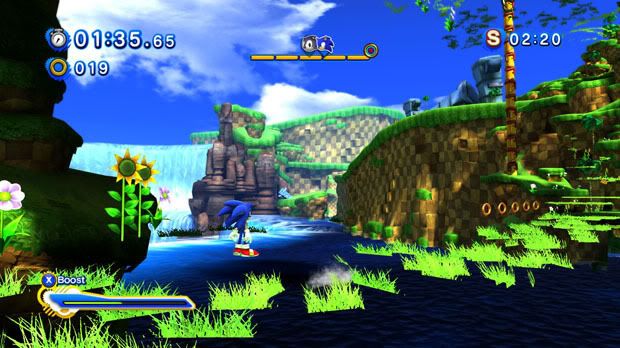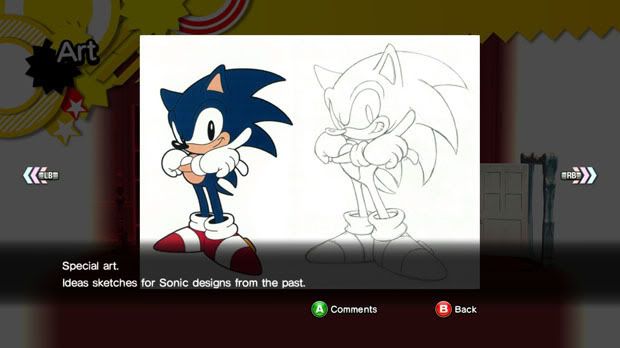Thursday 10 November 2011
Review: Sonic Generations (PC)
Sonic Generations: (PS3, Xbox 360 and PC)
PC Developer: Sonic Team, Devil's Details
Publisher: SEGA
Released: November 1, 2011
R.R.P: £19.99 (Steam)
Sonic Generations is the perfect homage to twenty years of brilliance. A cultivation of everything that has been achieved throughout Sonic Teams long-haul. From the 8-bit adventures, straight through to the transition to 3D, and now the current-gen era with every piece of Sonic's legacy intrinsically laid out for us.
The overall game is structured as 2 acts of classic and modern, inside of 3 different zones which when completed offer up extra challenges to the gamer in order to progress to a boss fight, followed by a further 3 zones, and so on and so forth as you continue to unlock the world map from left to right. The first noticeable thing is that the game-play is smooth and fluid. Rarely does the game-play ever seem disjointed, apart from occasionally in the modern acts where things can get a bit hectic and perhaps the level structure doesn't seem quite as intuitive as it could be. These are however problems that are inherent of speed in 3D games, and has plagued Sonic's transition to 3D ever since the first Sonic Adventure. The classic zones however excel in platforming. Although speed is an option, I feel you would be missing out here on what comes natural to the game-play. Exploration is fun. Rarely will two different play-throughs ever feel the same or take the same route, and this goes for the modern acts as well. This is one of the big factors that will keep you playing Generations for a while to come.
Possibly one of the greatest achievements of this game is the audio. Sure, you have all the expected sound effects from a Sonic game, and from that aspect you will find nothing out of the norm here. But where this really excels, is the music. This is an absolute treasure trove with remixes of all your past favorites, but also an endless stream of unlock-able classics and originals there for you to find. The way the acts are inherently structured, you have the classic and modern paths. The classic levels have typically Jun Senoue-esque renditions. Whereas the modern stages will sound more akin to the styles from Sonic Adventure, Heroes and onwards. A really nice touch here is how stages such as Green Hill and Sky Sanctuary are transformed effortlessly into the modern style, and vice versa with City Escape going back to Sonic's roots. They make this feeling stick well in the players minds, and reminds them that the game is running these eras in parallel. It works remarkably well and really helps the game carry its vision over to the player.
Another revolutionary introduction to the Sonic world, is the perk system whereby you earn points during the levels, and spend them on bonuses that you benefit from during play. Such as, after taking damage, rings lost will not disappear for 10 seconds. Your decline in speed will be minimized when going up sharp hills, and so on. This adds another dimension to the game and really encourages exploration of the best combos to make the time-attacks and challenges a lot more competitive and suit your own strengths and play-style.
Speaking of challenges. This is where the longevity in Generations really goes to a new level. I have always felt that previous Sonic games had missed out on this trick, as it is clearly a game that just begs for competitive time comparisons and head to heads with friends. Generations feels like it finally found its footing in this department. After fully unlocking 3 zones, you are introduced to mini challenges within them. Some of these are trivial and short. But others can be quite addictive, and just beg for playback and improvement. On top of this is the online system whereby you post your fastest scores throughout all the zones in the game. As well as the 30 second challenge whereby players see how far they can get through a level before the clock stops, allowing you to compare results with a friend.
The game on the whole feels brilliant. Yet, it is not without its flaws. Frequently I have managed to glitch the PC versions 'Havok' engine. Loop-De-loops getting caught midway for no reason and making the camera shake. Entire zones textures become invisible for no reason (all this on a machine that is clean, and fully up-to-date). Questionable voice acting is still present in cut-scenes with all of Sonics friends and comes across as hammish once again. If you base the games difficulty on the main stages alone, then in actual fact the game is too easy and does not take long to complete. You really have to look at the challenge modes to get the most out of the difficulty curb. The bosses are somewhat scripted, yet remain varied and fun. Frequently the modern stages will adopt a side scrolling platform view. And in some challenges it can be hard to remember which type of Sonic you are playing, and as a result which types of game mechanics you can take advantage of. The minor flaws present in this game though are ultimately few and far between however.
My favorite aspect of the game has to be the rewards system for completing challenges. Allowing you to piece together Sonics legacy bit by bit with unlockables such as concept art, music, characters biographies. If you aren't doing the challenges for the bragging rights, you'll be doing them for the unlockables. A very clever system that will appeal to all types of players.
Final thoughts:
Sonic Generations is a game that will take the hardcore fan a good 5 hours to play through. but the completionist a long time to master. There is a lot to do in this game, and the potential has clearly been realized. You can't help but feel however this is a swan song of the times that have passed, and perhaps a message from Sega to say enough is enough. It is now time to move on, embrace a new style and beginning. But whatever this new-found path Sonic Team shows us over the next 20 years, the game ultimately serves as a sentimental reminder that a good idea never get old.
9/10
Pros: Fluid and fun game-play. A whole host of unlockables. The best Sonic game to date.
Cons: Occasionally glitchy. Some challenges seem tacked on.
Reviewer: Barry Griffiths
Monday 7 November 2011
Canada Cup 2011
So the Canada Cup 2011 has now concluded, and I think everyone was surprised at the quality on show. Let's not mess around, this was E.V.O level talent. A more humble crowd, but in a few years time this will be just as big a tournament, and it was already every bit as exciting.
A couple of things. The live stream cost too much for premium, if you had of halved that, everyone would have gone for it I believe. The $8.95 became a running joke in the comments section and you could understand peoples frustrations to an extent, as they were clearly willing to pay, but just not that much. The regular stream wasn't up to much. A lot of restarts and lag, but in general it was good. Another small criticism would be, why don't you have someone to blog the results up on the website? Or at least copy that over from your official Twitter feed when its convenient. It feels odd not seeing any results on the site. I think you could even embed the twitch.tv feed onto your website as well, give it more traffic.
Now thats out of the way. The tournament itself: just wow. Some great talent on show here. The two that shone the clearest for me were Wolfkrone of Team USA and Kazunoko of Team eLive Japan. The Japanese themselves admit that they don't get as many good C. Viper players as USA. I myself find Viper a bit spammy, but with the questionable balancing of Arcade Edition these things happen, and you are expected to deal with it. Lets see how 2012 edition plays out.
Kazunoko is the #1 Yun in Japan, and it shows. Everybody hates Yun, its a scientific fact. But with Kazunoko you can't help but be impressed by how he constantly finds innovating ways to jab and keep at you relentlessly. He never lets up, and this pressure really seemed to intimidate his opponents.
One thing that was really noticeable throughout the tournament. People are so obsessed with which character is in which tier, and making the matchups even, that they forget to learn to deal with specific characters. This was especially evident with players like Blanka and Vega. Normally at tournament level you would not consider these as usable. But in the 5v5's Canada and Europe managed to catch people out with extremely impressive players using these characters.
Two big surprises in the 5v5's. Wolfkrone of Team USA OCV'd (one character victory'd) Team Japan 1. Japan 1, with names like Tokido, Mago, Momochi. The biggest names in the tournament, all brushed aside. Some people were half expecting this because he dominated them in singles. But really, to do it back to back again in 5v5's either shows how annoying his Viper is, or just how special a player he can be at this highest level, and I think we all know it's the latter.
The next shock was that Team eLive Japan (Japan 2) actually ended up winning the whole 5v5's. Not because I didn't think it was possible. I know that for a fact they would have OCV'd USA with Kazunoko if Floe hadn't been on his game, but he ended up taking him out earlier than eLive might have wanted. But then for eLive to go on and match USA game for game to bring it up to 4-4, I don't think many expected that. Not with the likes of Mike Ross and Justin Wong on their team. And wouldn't you know it. The grand finale was Wolfkrone (C. Viper) vs. Kindevu (C. Viper). One of Japans best trolls on the circuit, and he lived up to his name. Edging out Wolfkrone to win it for eLive Japan 5-4. Amazing stuff.
I learned some great things from the exceptional commentary. Not the least that around 4 out of 5 players in Team Japan 1 all play at the same arcade in Tokyo! Could you imagine playing there with those people? That's just insane. It makes me want to actually move there. I was also interested to hear about how the Japanese players prefer Arcade machines to playing online, as they feel when you put that money in, it's literally to them like you put yourself on the line, and it influences the way they play as a result. That and they don't have to put up with online lag of course >.> This is also the reason you don't see people using the full roster in Japan, because they always feel they want the best chance. But really, I want to go to that arcade some day. It would be such an experience even just to watch.
Learning about the difference in mindset of the Asian players compared to the west was also intriguing. Some would hear the crowd cheering them on and be almost surprised by their reaction. This would usually be because someone was playing USA or Canada, and then the opposite fans in the crowd would want the Asians to beat them. But the foreign players really love that energy the crowd brings in over to the west, they are not used to it at all, and it seems to be half the reason they keep coming back over. On the same flip of the coin there are the Asian players who play Yun characters etc, that get depicted as the bad-guys. I remember James Chen saying that some players don't like this, but others absolutely thrive on it, and that was interesting to see just how much the social interaction has influence on what the players actually do.
All in all, it was a great tournament. Lots of buzz and hype that you'd expect from a VG fighting tourney. With just a dash of "salt" and a hint of "free". We wouldn't have it any other way. They always say these things are completely different live, rather than streaming. Hopefully one day I can attend one of the big events. Or better yet, London gets their act together and can play host to the Daigo Umeharas, the Justin Wongs, the Kazunokos and the Wolfkrones/Tokidos. The list goes on. Either way London, get on it please! Oh and, shut up and take my money!
A couple of things. The live stream cost too much for premium, if you had of halved that, everyone would have gone for it I believe. The $8.95 became a running joke in the comments section and you could understand peoples frustrations to an extent, as they were clearly willing to pay, but just not that much. The regular stream wasn't up to much. A lot of restarts and lag, but in general it was good. Another small criticism would be, why don't you have someone to blog the results up on the website? Or at least copy that over from your official Twitter feed when its convenient. It feels odd not seeing any results on the site. I think you could even embed the twitch.tv feed onto your website as well, give it more traffic.
Now thats out of the way. The tournament itself: just wow. Some great talent on show here. The two that shone the clearest for me were Wolfkrone of Team USA and Kazunoko of Team eLive Japan. The Japanese themselves admit that they don't get as many good C. Viper players as USA. I myself find Viper a bit spammy, but with the questionable balancing of Arcade Edition these things happen, and you are expected to deal with it. Lets see how 2012 edition plays out.
Kazunoko is the #1 Yun in Japan, and it shows. Everybody hates Yun, its a scientific fact. But with Kazunoko you can't help but be impressed by how he constantly finds innovating ways to jab and keep at you relentlessly. He never lets up, and this pressure really seemed to intimidate his opponents.
One thing that was really noticeable throughout the tournament. People are so obsessed with which character is in which tier, and making the matchups even, that they forget to learn to deal with specific characters. This was especially evident with players like Blanka and Vega. Normally at tournament level you would not consider these as usable. But in the 5v5's Canada and Europe managed to catch people out with extremely impressive players using these characters.
Two big surprises in the 5v5's. Wolfkrone of Team USA OCV'd (one character victory'd) Team Japan 1. Japan 1, with names like Tokido, Mago, Momochi. The biggest names in the tournament, all brushed aside. Some people were half expecting this because he dominated them in singles. But really, to do it back to back again in 5v5's either shows how annoying his Viper is, or just how special a player he can be at this highest level, and I think we all know it's the latter.
The next shock was that Team eLive Japan (Japan 2) actually ended up winning the whole 5v5's. Not because I didn't think it was possible. I know that for a fact they would have OCV'd USA with Kazunoko if Floe hadn't been on his game, but he ended up taking him out earlier than eLive might have wanted. But then for eLive to go on and match USA game for game to bring it up to 4-4, I don't think many expected that. Not with the likes of Mike Ross and Justin Wong on their team. And wouldn't you know it. The grand finale was Wolfkrone (C. Viper) vs. Kindevu (C. Viper). One of Japans best trolls on the circuit, and he lived up to his name. Edging out Wolfkrone to win it for eLive Japan 5-4. Amazing stuff.
I learned some great things from the exceptional commentary. Not the least that around 4 out of 5 players in Team Japan 1 all play at the same arcade in Tokyo! Could you imagine playing there with those people? That's just insane. It makes me want to actually move there. I was also interested to hear about how the Japanese players prefer Arcade machines to playing online, as they feel when you put that money in, it's literally to them like you put yourself on the line, and it influences the way they play as a result. That and they don't have to put up with online lag of course >.> This is also the reason you don't see people using the full roster in Japan, because they always feel they want the best chance. But really, I want to go to that arcade some day. It would be such an experience even just to watch.
Learning about the difference in mindset of the Asian players compared to the west was also intriguing. Some would hear the crowd cheering them on and be almost surprised by their reaction. This would usually be because someone was playing USA or Canada, and then the opposite fans in the crowd would want the Asians to beat them. But the foreign players really love that energy the crowd brings in over to the west, they are not used to it at all, and it seems to be half the reason they keep coming back over. On the same flip of the coin there are the Asian players who play Yun characters etc, that get depicted as the bad-guys. I remember James Chen saying that some players don't like this, but others absolutely thrive on it, and that was interesting to see just how much the social interaction has influence on what the players actually do.
All in all, it was a great tournament. Lots of buzz and hype that you'd expect from a VG fighting tourney. With just a dash of "salt" and a hint of "free". We wouldn't have it any other way. They always say these things are completely different live, rather than streaming. Hopefully one day I can attend one of the big events. Or better yet, London gets their act together and can play host to the Daigo Umeharas, the Justin Wongs, the Kazunokos and the Wolfkrones/Tokidos. The list goes on. Either way London, get on it please! Oh and, shut up and take my money!
Subscribe to:
Posts (Atom)
